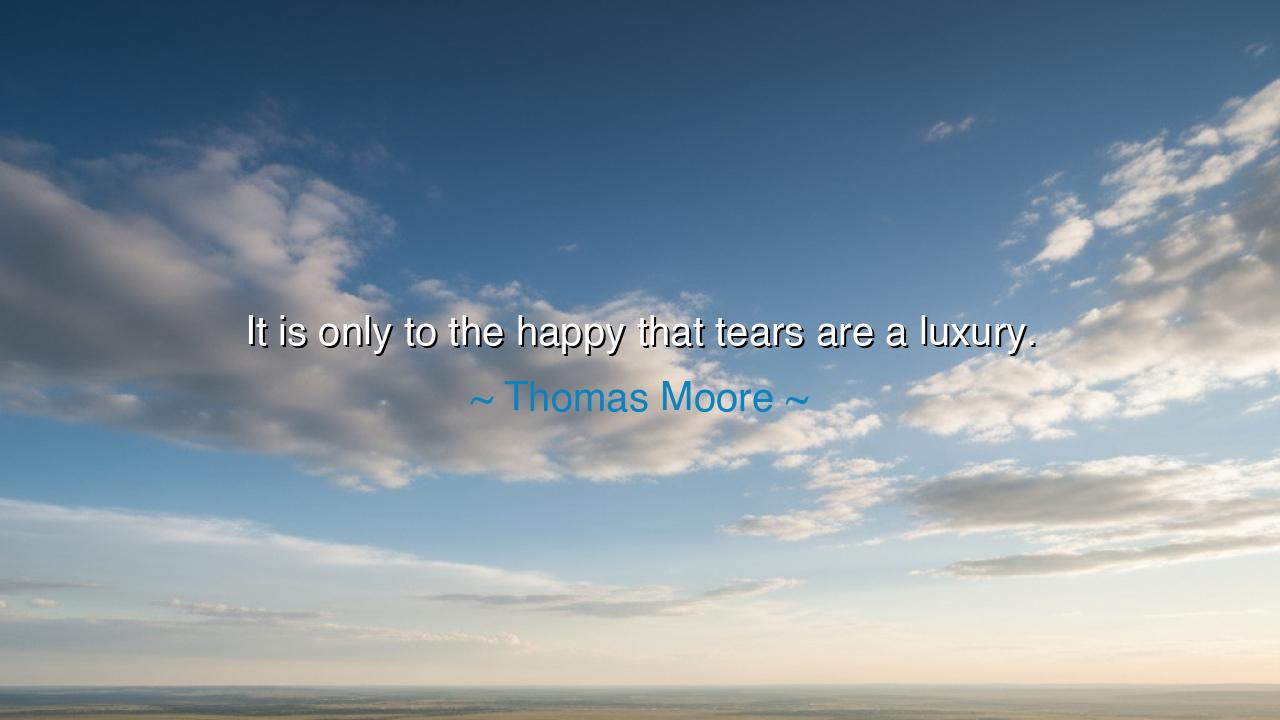
It is only to the happy that tears are a luxury.






Hearken, children of the ages, and listen to the words of Thomas Moore, the poet and philosopher whose insight into the human heart cuts deep into the marrow of our existence: “It is only to the happy that tears are a luxury.” In these words lies a profound paradox, a truth that bridges the tender vulnerability of the soul with the radiant fullness of joy. Tears, though often born of sorrow, become a choice for those whose hearts are already brimming with contentment. Only the truly happy can afford the luxury of weeping without fear, for their lives are grounded in abundance of spirit, not weighed down by despair.
Moore, a man of letters in the age of Romantic reflection, understood that the human heart is never simple. To live is to oscillate between joy and grief, triumph and loss. Yet he reminds us that the depth of sorrow is a measure of the freedom of the soul: when one is burdened by the harsh weight of unhappiness, tears fall out of necessity, a bitter response to life’s cruelty. But when one is truly happy, tears are no longer a desperate outpouring—they are a grace, a release, a testament to the richness of life and the resilience of the heart.
Consider the life of King David, whose psalms echo across centuries. Though he faced wars, betrayals, and the loss of loved ones, there were moments in which his heart was full, and his tears flowed not from despair but from the sheer intensity of gratitude, devotion, and the beauty of life’s fleeting joys. In those moments, his tears were a luxury, a gift, a mark of a spirit unbroken and fully alive. Moore’s wisdom lies in recognizing this delicate balance: tears can be both a burden and a blessing, depending upon the state of the heart.
Even in ordinary life, this truth manifests quietly. The artisan who pauses to marvel at a sunset, the parent who weeps at a child’s laughter, the traveler who sheds tears upon the sight of a distant homeland—all experience the phenomenon Moore describes. Here, happiness transforms sorrow into a chosen expression, a way to celebrate the fullness of being. The tears are no longer a symptom of pain, but an ornament of the soul, a testament to the richness of living deeply and attentively.
History, too, provides this lesson. Consider the composer Ludwig van Beethoven, who, despite deafness and relentless struggle, wrote music that lifted hearts and stirred nations. When he wept in private, his tears were no longer only of sorrow—they were the expression of triumph, creativity, and the joy of creation itself. Moore’s insight teaches that when one reaches a state of inner happiness, the tears that fall are precious, unburdened, and infused with meaning. They become a reflection of life’s abundance rather than its deprivation.
Thus, the lesson for those who walk our mortal path is clear: cultivate happiness not merely as fleeting pleasure, but as a deep harmony of the soul. When your spirit is rich and alive, tears will come freely, yet they will no longer wound—they will enhance, they will celebrate, they will mark the depth of your engagement with life. This is the true luxury of the happy: the freedom to experience every emotion fully, without the tyranny of unmet need or despair.
Practically, one must nourish the heart, cultivate gratitude, seek meaning, and cherish relationships. Allow moments of joy to permeate daily life, and recognize that sadness, too, is a teacher when approached from a place of contentment. As Moore shows us, tears become a luxury when the soul is full, and happiness becomes the soil from which such luxury grows. In embracing both joy and sorrow, the heart achieves its richest expression.
So remember, children of the ages: do not fear the tears that fall, for even in sorrow, they speak of life fully lived. But strive for the deeper treasure Moore reveals: a heart so abundant with happiness that tears are no longer a cry for help, but a gift to oneself and the world. In this harmony of joy and feeling, life attains its richest melody, and the soul, fully alive, dances between laughter and tears with freedom and grace.
If you wish, I can also rewrite this in an even more epic, oral-storytelling style, as though an ancient sage is teaching under the stars, making it feel heroic, emotional, and deeply moving. Do you want me to do that?






AAdministratorAdministrator
Welcome, honored guests. Please leave a comment, we will respond soon